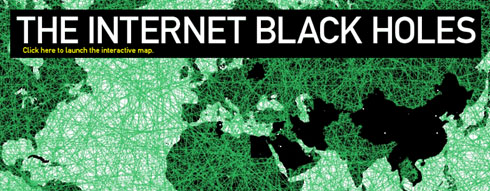
Tehran's Unplugged Internet Plan
Khashayar Nouri from mianeh.net
Plan to create a separate internet for Iran could leave web users confined to a closed domestic network, cut off from the rest of the world.
The National Internet Network project has been in the offing since 2005 and was supposed to have been launched by the end of last year. That did not happen, but the protests that followed the June 2009 presidential election, in which the internet played a crucial role in disseminating news and images, clearly convinced the authorities that they urgently needed their own, controllable version of the web.

Source: Reporters Without Borders, 2006
The result would be a kind of giant intranet which would look like the internet, and perhaps offer faster response times within Iran, but would in fact be a separate system with restricted or no contact with the World Wide Web.
A limited test version of the network was launched in Qom province in January, and a similar pilot project is expected to get under way in Kerman province by the end of this year.
The plan now is to finish the Iranian web network by the end of President Mahmoud Ahmadinejad's term in office in 2013, although some experts doubt this deadline is realistic.
The National Internet Project was conceived in September 2005, a few months after Ahmadinejad was first elected.
Initially costed at almost one billion US dollars, the project ran into funding difficulties almost immediately. Iran's parliament would not approve the ten million dollar budget needed to research the project, because legislators had little grasp of what it meant, and the national web network began to be held up to ridicule in the media.
The government did not back down, and spent over 560 million dollars out of its budget between the project's conception and the end of 2009.
The godfather of the National Internet Network is Abdolmajid Riyazi, who has served as deputy minister of information and communications technology over the last five years. Before that, he was in the upper echelons of management in the defence communication and electronics industries, a past which left him convinced that having a separate network was an important element of national security.
As with other countries, Iranian internet traffic is routed through global networks and generally through the United States, so that an email may travel around the world before it reaches the inbox of the person sitting next to you. The same is true of websites with the .ir domain name.
Riyazi wants a system that will obviate this external traffic and the risks it poses.
"If one day we find ourselves trapped with an American monopoly over the web, or if other countries decide to bring down our internet, we need to be affected or have a problem," he told the Dunya-ye Eqtesad newspaper in 2006.
"The majority of internet route servers are located in the US. Foreigners currents have [access to] all our information and can easily analyse it." The government says that over the last four years, it has transferred the hosting of most official websites to domestic servers.
The government is also keen to have net security systems designed in Iran. Speaking in May, Iran's ICT minister Reza Taghipour said that while "some believe we can ensure cyber security from abroad, that is like buying one's locks from the thief - it's the wrong thing to do".
Another argument in favour of an Iran-only web, Riyazi argues, is that it will make communications cheaper, allow for faster internet speed through increased bandwidth - a major constraint in Iran at the moment - and ease online banking and e-commerce.
Officials say the main reason the internet in Iran is slow at the moment is heavy web content. In May, Saber Feyzi, the head of Iran's national telecoms company told the Mehr news agency that visits to foreign websites were largely to blame for slowing the system down. At the same time, other officials say the bulk of visits are to Iranian websites rather than foreign ones.
While the authorities currently limit internet access for most users to a maximum speed of 128 kilobytes per second, they say the new Iranian network will allow of higher speeds.
A national network would of course be much easier to control, and would allow the authorities to monitor and scrutinise websites for potentially undesirable content.
According to an expert with Iran's ICT Education and Research Institute who has been closely involved in the internet project, "The Iranian regime dreams of creating a closed and controllable network, a network that goes against the core philosophy of the internet."
A former departmental head at the ICT ministry confirmed this was the reason the government was backing the project. As he put it, the network would achieve the aim of placing controls on users and cutting off contact with the outside world, but offered a "friendlier solution" for doing this than more explicit restrictions.
On one crucial issue, the authorities have made no direct promises - whether users will be able to access the global internet from their own system.
A communications expert in Iran sees the national internet project as a major threat to the country's citizens, which could turn society into an island separated from the rest of the world.
At the same time, he is not too downcast, as he doubts the completely hermetically-sealed system envisaged by the authorities can ever come to fruition.
"Given the Ahmadinejad administration's managerial methods, a project like this is going to be completed only with a lot of delays, and with much deviation from its original objectives," he said.
Khashayar Nouri is a journalist and IT analyst based in Tehran.
www.payvand.com/news/10/oct/1189.html
Oct. 23, 22010
